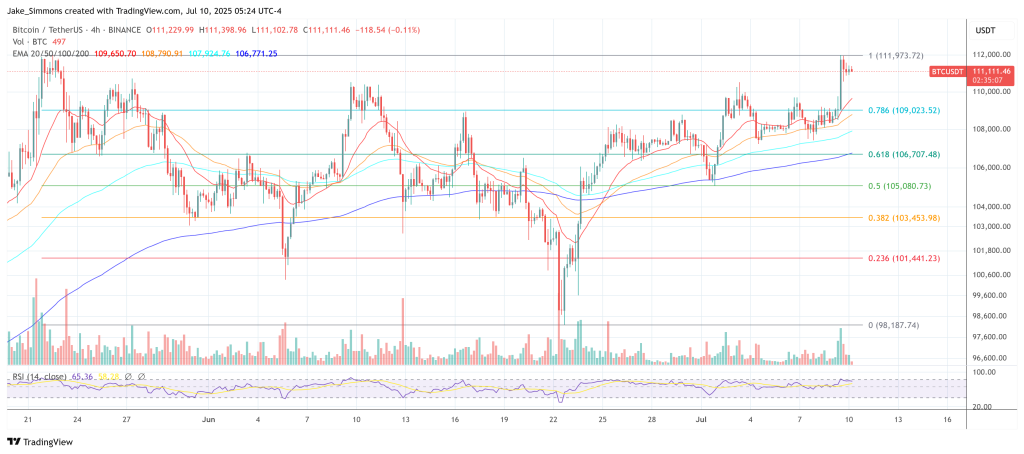The Bitcoin Policy Institute (BPI) has released a 30-page model bill designed to let US state treasuries treat BTC as a strategic reserve asset, codifying everything from multisignature custody to tax-advantaged economic zones. Titled the “State-Level Strategic Bitcoin Reserve Toolkit,” the document arrives amid growing institutional adoption of the asset class and lays out a path for states to “diversify treasury holdings, hedge against currency debasement, and enhance long-term fiscal stability,” a goal the authors describe as a “paradigm shift in monetary technology”.
States Should Hold 3% In Bitcoin
Authored by BPI’s head of policy Zack Shapiro and research associate Zack Cohen, the toolkit asserts that existing fiduciary mandates already empower treasurers to hold BTC and urges lawmakers to seize a “competitive advantage” in attracting digital-asset businesses . States adopting the framework would be required to create a Strategic Bitcoin Reserve (SBR) kept entirely in cold storage and controlled through a Multi-Institution Custody system that distributes keys among three to seven independent entities so that “no single institution, custodian, or individual maintains unilateral control” over state coins.
The proposal obliges each state to earmark “no less than three percent of the prior fiscal year’s average daily balance in the General Operating Fund” for annual Bitcoin purchases, with additional inflows permitted from seized assets, cryptocurrency tax payments and a new class of tax-exempt Municipal BitBonds. Once acquired, Bitcoin “shall be held for a minimum period of twenty years,” barring extraordinary legislative action, and is explicitly prohibited from being lent, rehypothecated or placed in derivative contracts.
Section 5 imposes a real-time Proof-of-Reserves regime: the treasury must publish cryptographic signatures, wallet addresses and balance updates “within one hour of any material change,” giving the public continuous on-chain insight into state coffers. Biennial reports must supplement the on-chain data with cost basis, performance analysis and incident disclosures. Oversight is anchored by a seven-member Strategic Bitcoin Reserve Advisory Committee that includes representatives from the governor, legislature, pension system, academia and the banking sector. The legislative audit division retains authority to probe the program at least once every three years.
Beyond balance-sheet diversification, the bill ventures into industrial policy. It authorizes Bitcoin Tax-Advantaged Zones offering capital-gains exemptions, sales-tax relief on mining hardware and payroll-tax rebates for firms deriving at least 60 percent of revenue from BTC activity . Mining itself is framed as an emissions-mitigation tool: state agencies are instructed to target stranded energy, flare-gas capture and renewable-grid balancing, with at least five percent of mining proceeds flowing into a dedicated conservation fund.
The drafters envision an aggressive rollout. Within 90 days of enactment a treasury would have to complete its first purchase; full operational capacity—including custody infrastructure, insurance and reporting systems—must be reached within 120 days. Continuous disaster-recovery drills and cyber-incident protocols underpin the reserve’s security architecture.
Notably, three US states have already put a strategic Bitcoin reserve into law. New Hampshire became the pioneer on 6 May 2025 when Governor Kelly Ayotte signed HB 302, authorizing the treasurer to allocate up to five percent of certain state funds to Bitcoin and other digital assets.
Arizona followed on 7 May 2025 with HB 2749, creating a Bitcoin and Digital Assets Reserve Fund inside the treasurer’s office to hold abandoned or seized cryptocurrency in-kind rather than liquidate it. Texas joined on 20 June 2025 as Governor Greg Abbott approved SB 21, the Texas Strategic Bitcoin Reserve and Investment Act, giving the comptroller explicit authority to buy and custody Bitcoin for the state.
At press time, BTC traded at $111,111.

from Bitcoinist.com https://ift.tt/dovt368
Comments
Post a Comment